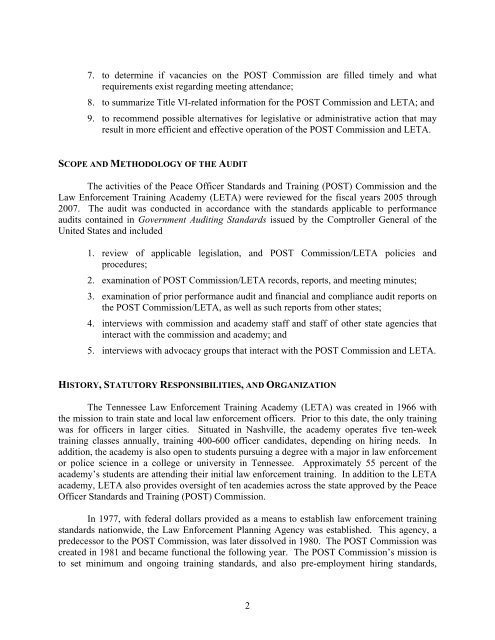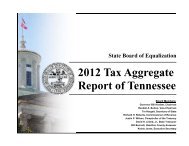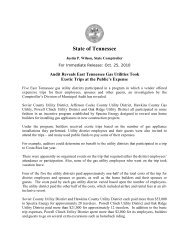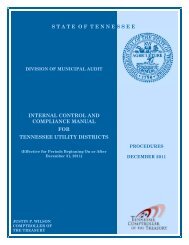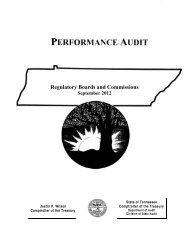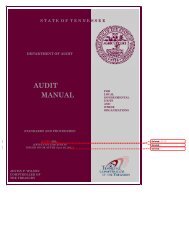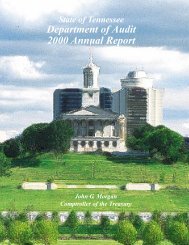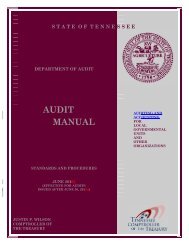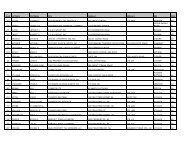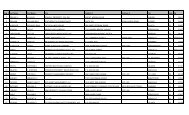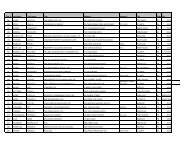Peace Officer Standards and Training Commission and Law ...
Peace Officer Standards and Training Commission and Law ...
Peace Officer Standards and Training Commission and Law ...
- No tags were found...
You also want an ePaper? Increase the reach of your titles
YUMPU automatically turns print PDFs into web optimized ePapers that Google loves.
7. to determine if vacancies on the POST <strong>Commission</strong> are filled timely <strong>and</strong> whatrequirements exist regarding meeting attendance;8. to summarize Title VI-related information for the POST <strong>Commission</strong> <strong>and</strong> LETA; <strong>and</strong>9. to recommend possible alternatives for legislative or administrative action that mayresult in more efficient <strong>and</strong> effective operation of the POST <strong>Commission</strong> <strong>and</strong> LETA.SCOPE AND METHODOLOGY OF THE AUDITThe activities of the <strong>Peace</strong> <strong>Officer</strong> <strong>St<strong>and</strong>ards</strong> <strong>and</strong> <strong>Training</strong> (POST) <strong>Commission</strong> <strong>and</strong> the<strong>Law</strong> Enforcement <strong>Training</strong> Academy (LETA) were reviewed for the fiscal years 2005 through2007. The audit was conducted in accordance with the st<strong>and</strong>ards applicable to performanceaudits contained in Government Auditing <strong>St<strong>and</strong>ards</strong> issued by the Comptroller General of theUnited States <strong>and</strong> included1. review of applicable legislation, <strong>and</strong> POST <strong>Commission</strong>/LETA policies <strong>and</strong>procedures;2. examination of POST <strong>Commission</strong>/LETA records, reports, <strong>and</strong> meeting minutes;3. examination of prior performance audit <strong>and</strong> financial <strong>and</strong> compliance audit reports onthe POST <strong>Commission</strong>/LETA, as well as such reports from other states;4. interviews with commission <strong>and</strong> academy staff <strong>and</strong> staff of other state agencies thatinteract with the commission <strong>and</strong> academy; <strong>and</strong>5. interviews with advocacy groups that interact with the POST <strong>Commission</strong> <strong>and</strong> LETA.HISTORY, STATUTORY RESPONSIBILITIES, AND ORGANIZATIONThe Tennessee <strong>Law</strong> Enforcement <strong>Training</strong> Academy (LETA) was created in 1966 withthe mission to train state <strong>and</strong> local law enforcement officers. Prior to this date, the only trainingwas for officers in larger cities. Situated in Nashville, the academy operates five ten-weektraining classes annually, training 400-600 officer c<strong>and</strong>idates, depending on hiring needs. Inaddition, the academy is also open to students pursuing a degree with a major in law enforcementor police science in a college or university in Tennessee. Approximately 55 percent of theacademy’s students are attending their initial law enforcement training. In addition to the LETAacademy, LETA also provides oversight of ten academies across the state approved by the <strong>Peace</strong><strong>Officer</strong> <strong>St<strong>and</strong>ards</strong> <strong>and</strong> <strong>Training</strong> (POST) <strong>Commission</strong>.In 1977, with federal dollars provided as a means to establish law enforcement trainingst<strong>and</strong>ards nationwide, the <strong>Law</strong> Enforcement Planning Agency was established. This agency, apredecessor to the POST <strong>Commission</strong>, was later dissolved in 1980. The POST <strong>Commission</strong> wascreated in 1981 <strong>and</strong> became functional the following year. The POST <strong>Commission</strong>’s mission isto set minimum <strong>and</strong> ongoing training st<strong>and</strong>ards, <strong>and</strong> also pre-employment hiring st<strong>and</strong>ards,2


